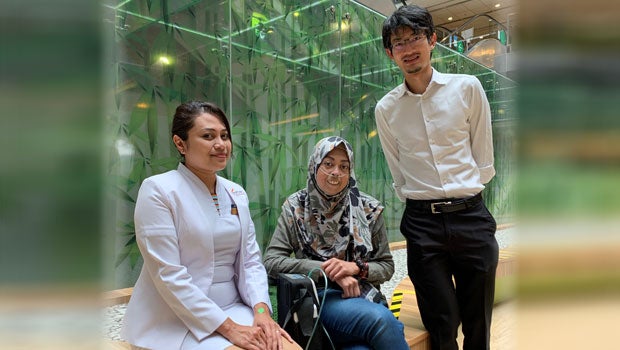
Nurse Clinician Aidila Binte Ismail, together with patient support group member Ms Haslina Wannor and Associate Professor Jonathan Yap.
Pulmonary Arterial Hypertension is a rare and challenging condition, but there are ways to effectively manage it. The clinicians at the National Heart Centre Singapore are specially trained to offer a comprehensive array of treatment options, making it a centre of excellence for South East Asia.
For patients with Pulmonary Arterial Hypertension (PAH), daily medications and lifelong treatment have become the reality of their lives. One form of treatment is a continuous intravenous (IV) infusion. It may be a better way to manage their condition, but it comes with its own set of challenges. With strong support from their healthcare team and caregivers, patients can see improvement in their symptoms.
Get updates on Tomorrow's Medicine in your mailbox! Click here to subscribe.
Supporting IV Therapy
PAH is a condition where the smallest arteries in the lungs are narrowed, causing an increase in blood pressure in the lungs. This chronic condition can weaken the heart muscles over time and lead to premature death. Between the two main treatments of oral medication and IV therapy, the latter is proven to have better outcomes in suitable patients.
Assoc Prof Jonathan Yap, a Consultant at the Department of Cardiology, National Heart Centre Singapore (NHCS) said, “The use of IV epoprostenol for the treatment of PAH has one of the strongest base of evidence for improvement of symptoms and survival. However, it is a practical challenge for patients to manage and live with a continuous IV infusion 24 hours a day, for seven days a week.”
PAH affects approximately 200 patients in Singapore. Currently, NHCS has a dedicated healthcare team treating patients with various forms of pulmonary hypertension and is the only local centre to offer IV therapy for PAH patients. Although IV therapy has more promising outcomes, it is not an easy journey for patients who opt for it.
Nurse Clinician Aidila Binte Ismail, who specialises in IV therapy for PAH patients, said, “Months of planning, counselling and teaching need to take place before the patient embarks on this journey. It requires lifelong commitment, not just from the patients but also their caregivers, who have to step in to help if patients are unable to administer the treatment at times.”
Ms Aidila went for training in London to learn about IV therapy from the healthcare team and PAH patients, and she is the only trained local nurse handling IV therapy. Besides teaching patients how to self-manage the treatment, she has to provide the needed support and reassurance to help them overcome any hurdles.
“A lot of times, I have to convince patients and their family the benefits of this treatment, and help them manage their fear of handling the equipment and drugs. Some patients may also need help to seek financial support from medical social service,” she explained.
Apart from the healthcare team, NHCS also runs a patient support group to link up patients and their caregivers with others on the treatment. This helps to put their minds at ease and boost their confidence in managing the journey.
Learning Hub for Pulmonary Hypertension

A multi-disciplinary team is key in providing timely care for patients with PAH (L-R): Senior Staff Nurse Sumathy D/O Perumal, Nurse Clinician Aidila Bte Ismail, Assoc Prof Jonathan Yap, Assoc Prof Lim Soo Teik, Assoc Prof Tan Ju Le and Senior Staff Nurse Lim Chee Lan.
Besides providing IV therapy, NHCS trains both local and regional healthcare professionals in managing PAH. It ran a series of biannual Pulmonary Hypertension Preceptorship Week for clinicians and nurses from the region to attend masterclasses and join work attachments. Through these sharing, healthcare professionals exchange information on this rare disease and learn new treatment options to benefit their patients.
Nurses from Brunei and Malaysia have attended attachments at NHCS to observe Ms Aidila’s work on IV therapy. They shadowed her and watched how she administered the treatment, similar to the way she learned from her counterparts in London.
Nurul Na’aisyah Muhd Sulaiman, a nurse from Brunei, found the five-day programme beneficial. She said, “I really learned a lot about PAH care, management and education. The doctors and nurses helped to explain the details and clear our doubts. I hope to start the PAH programme with our healthcare team as soon as possible.”
Besides treating PAH, the team at NHCS sees patients with other forms of pulmonary hypertension. NHCS is the only local centre with a multidisciplinary team to treat chronic thromboembolic pulmonary hypertension, offering therapies including pulmonary endarterectomy and balloon pulmonary angioplasty.
With the expertise at NHCS comprising clinicians from various specialties, any local patient suspected to have pulmonary hypertension can be referred to NHCS. Patients benefit from an integrated care plan jointly managed by different specialists, and the convenience of a one-stop visit.
Assoc Prof Yap is optimistic that the field of pulmonary hypertension will continue to grow with better treatments and outcomes for patients. He said, “Pulmonary hypertension is a rare disease with very poor outcomes if not treated. With improving treatment options, there is much hope for PAH patients.”
Get updates on Tomorrow's Medicine in your mailbox! Click here to subscribe.













 Get it on Google Play
Get it on Google Play